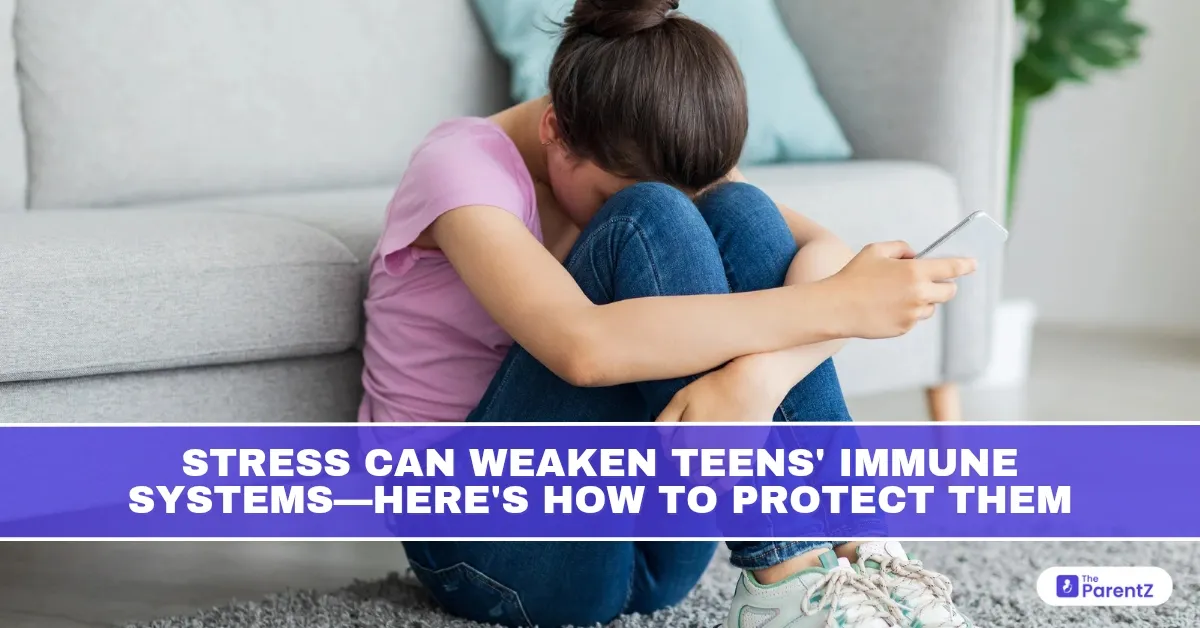This Is Something Every Parent Needs to Know
Teenagers today are under more pressure than ever from academics, social media, peer expectations, and often their own self-imposed standards. What many don’t realise is that this constant stress doesn’t just affect their mood; it can actually weaken their immune system, leaving them more vulnerable to infections, fatigue, and even long-term health risks.
If you’re a parent, guardian, or educator, understanding how stress impacts a teen’s immunity can help you support them more effectively, emotionally and physically.
How Does Stress Affect the Immune System?
Stress, especially when chronic, triggers a cascade of hormonal changes in the body.
When teens are stressed, their bodies release cortisol, the primary stress hormone. While short-term cortisol surges can help them stay alert (like during exams), prolonged high levels suppress immune function.
According to a 2017 study published in Psychoneuroendocrinology, chronic stress reduces the production of white blood cells (like lymphocytes), which are essential for fighting infections. It also increases inflammatory markers, which are linked to everything from asthma to autoimmune conditions.
PubMed-backed studies have confirmed:
- Teens with high stress levels are more likely to catch colds and take longer to recover.
- Academic stress can reduce vaccine efficacy and antibody response.
- Poor sleep due to stress compounds immune suppression.
Signs Your Teen’s Immune System May Be Affected by Stress
You might notice:
- Frequent colds or sore throats
- Unusual tiredness or fatigue
- Digestive issues (due to gut-immune connection)
- Headaches or body aches
- Trouble sleeping or mood swings
These signs may overlap with regular growing pains or school stress—but if they’re consistent, it’s time to look deeper.
What Parents Can Do: 7 Protective Strategies
Let’s explore some natural, science-backed ways you can help your teen reduce stress and support immune health.
1. Prioritise Sleep Hygiene
Teens need 8–10 hours of quality sleep for both mental clarity and immune function.
Tips:
- Set screen curfews (ideally no screens 1 hour before bed)
- Encourage wind-down routines (journaling, music, deep breathing)
- Create a calm, tech-free sleep environment
2. Encourage Movement, Not Just Exercise
Physical activity helps regulate cortisol and boosts immunity.
Ideas: Dancing, cycling, nature walks, sports, or even yoga. Make it fun and non-competitive.
3. Create a Calm Nutrition Environment
Nutrient-dense foods rich in zinc, vitamin C, vitamin D, and probiotics help support immunity.
Superfoods for teens:
- Berries
- Oranges
- Yogurt or kefir
- Pumpkin seeds
- Leafy greens
- Whole grains
Avoid excessive caffeine or energy drinks that spike anxiety.
4. Teach Emotional Regulation Skills
Teens often need help identifying and managing stress.
Try:
- Journaling or art therapy
- Open conversations without judgment
- Breathing techniques (Box breathing or 4-7-8 method)
Even teaching them to name the emotion they’re feeling reduces stress responses.
5. Set Realistic Expectations
Academic pressure can trigger toxic stress. Reassure your teen that effort matters more than perfection.
Let them know:
“It’s okay to have bad days. You’re not alone, and you don’t have to carry everything by yourself.”
6. Limit Doomscrolling and Digital Overload
Social media can amplify stress and comparison anxiety.
Boundaries help:
- App time limits
- Phone-free zones (like during meals)
- Following positive, uplifting pages
Encourage digital detox weekends or time off during exams.
7. Get Professional Help When Needed
If stress is affecting your teen’s eating, sleep, schoolwork, or mood, don’t wait to ask for help.
Pediatricians, school counsellors, or mental health professionals can provide coping tools or check for underlying concerns like anxiety or depression.
A Gentle Word from a Health Advocate
As someone who deeply believes in empowering young people through science and self-awareness, I want to remind you: teenagers are incredibly resilient, but they also need support and structure.
By helping them manage stress early, we’re not just boosting their immune system, we’re giving them a foundation of emotional strength they’ll carry for life.
Conclusion: Strengthen Their Immunity with Compassion, Not Control
Stress is a part of growing up, but chronic stress shouldn’t be. By staying alert to the signs and creating a supportive, nourishing environment, you can protect your teen’s health from the inside out.
Remember, it’s not just about vitamins and veggies, it’s about listening, loving, and leading by example.
Their immune system and their future will thank you for it.





Be the first one to comment on this story.